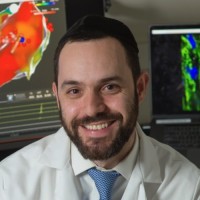Alexander Kushnir
Cardiac Electrophysiology Attending
New York University Langone Medical Center

Cardiac Electrophysiology Attending
New York University Langone Medical Center
September 05, 2025 | 02:00 PM (EDT) - 02:45 PM (EDT)
About Alexander Kushnir, MD, PhD
Early in my education, I became fascinated by the role electricity plays in making the heart beat. For 17 years, I worked in molecular cardiology laboratories, studying how electrical signals are transmitted in the heart through ion channels and how small changes in these circuits cause abnormal heart rhythms and, sometimes, death. I worked on novel therapies for treating abnormal heart rhythms and published more than 20 articles and textbook chapters. Now, as a clinical cardiac electrophysiologist, I am able to use this expertise to help patients live longer, healthier lives.
Patients see me for heart rhythm conditions. These include atrial fibrillation, ventricular tachycardia, and supraventricular tachycardia, which cause the heart to beat too quickly, as well as bradycardia, which causes the heart to beat too slowly.
I specialize in restoring and maintaining a normal heart rhythm using a minimally invasive technique called catheter ablation. During this procedure, a catheter is used to pinpoint and eliminate (ablate) the heart tissue responsible for a fast heartbeat. It is satisfying to see patients feel better and help to reduce the number of arrhythmia medications they need to take.
When a patient’s heart rate is too slow, I implant a pacemaker, which ensures the heart continues to beat. I use the latest techniques to implant the pacemaker’s wires in a specific region of the heart known as the “left bundle.” With this approach, the pacemaker connects to the heart’s natural electrical system, resulting in better outcomes for patients.
Through my work at the Joan H. and Preston Robert Tisch Center at Essex Crossing and NYU Langone Medical Associates—Chelsea, I listen to patients’ concerns and help them understand their condition and treatment options.
Every morning, the entire cardiac electrophysiology team at NYU Langone reviews each patient’s treatment plan. Each doctor brings a unique perspective to the discussion, ensuring patients receive the most appropriate and effective treatment.
My research interests include the development of computer programs that analyze heart rhythm data to identify the most effective treatment strategies for patients.
It is rewarding to spend my days helping patients achieve a normal heart rhythm.